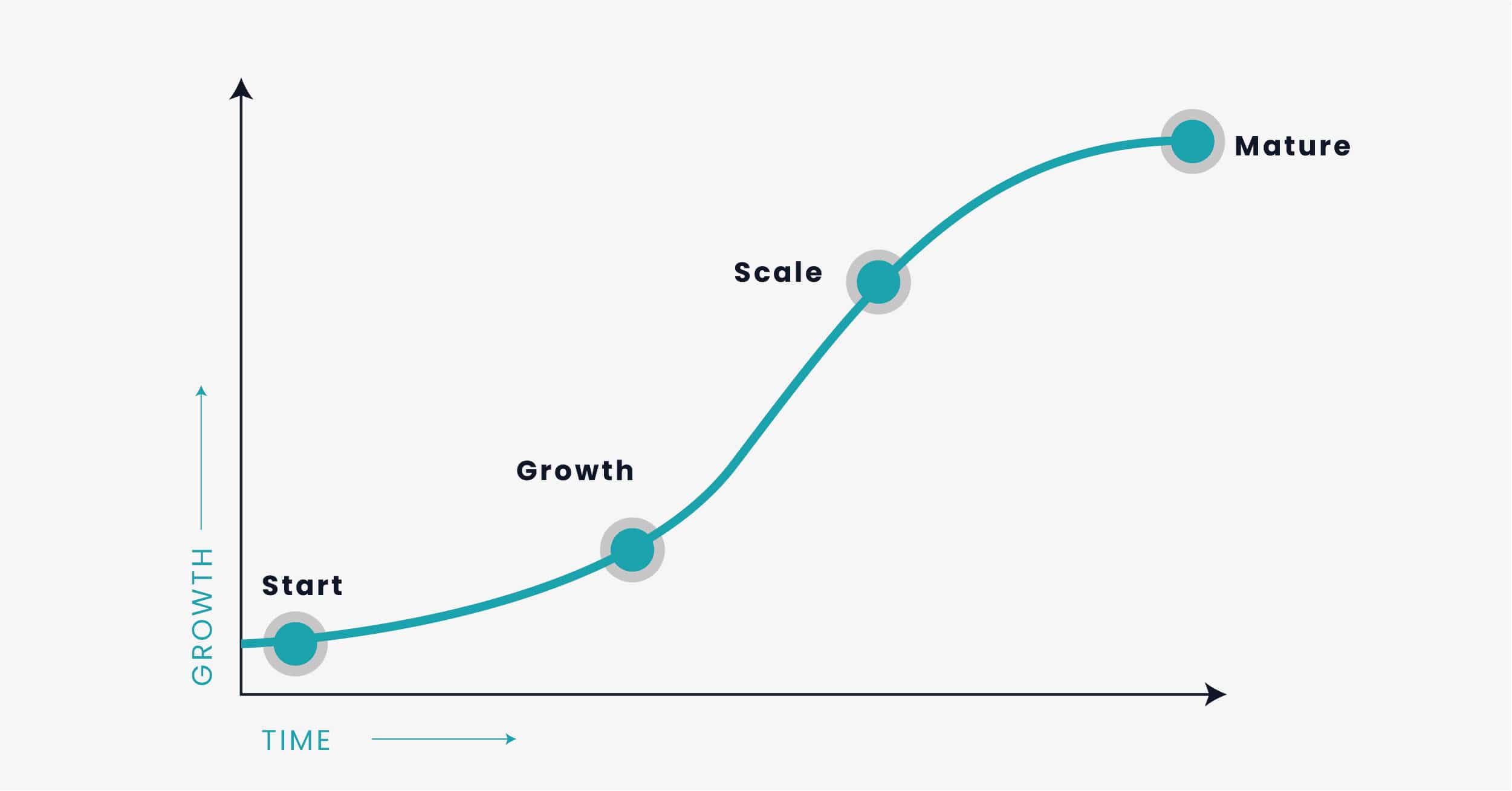Your startup has reached a crucial milestone – you established a market with a demand for your product or service, you attracted investors, your business is profitable and growing fast. It’s time to scale.

Referred to as hypergrowth, some startups grow at an explosive rate. Hypergrowth refers to the steep part of the S-curve, where startups are scaling so rapidly that they need to move quickly to ensure that they have the right talent in place to support the pace of the company’s growth. The employee count rises steeply and the startup’s company culture is at risk, if it’s not managed well.
Before diving in further, let’s review a brief definition of company culture:
What is Company Culture?
“Company culture is defined as a set of
shared values, goals, attitudes and practices
that characterize an organization.”
Source: BuiltIn
Successful startup founders live their company culture, outlining goals, emphasizing values, leading by example, inspiring curiosity and working closely with their team members. Founders are leaders, communicating the startup’s core values and building company culture from the start in every interaction and decision.
While this shouldn’t change during times of rapid growth, a steep increase in new hires makes it impossible for everyone to work closely to the founder as teams grow and management levels get added. However, experiencing the entrepreneurial spirit and company culture “from the source” doesn’t have to suffer, but it takes planning and awareness to keep and scale startup company culture in times of rapid growth.
Contents
Company Culture in Fast-Growing Companies
Fast-growth and hypergrowth startups face many challenges. Why is it important to focus on the scaling of your company culture?
[…] nobody 10 or 20 or 30 years from now is going to remember what deals we’ve won or lost or what the returns were on this or that. You’re going to remember what it felt like to work here and to do business with us and what kind of imprint we put on the world. And that’s our culture. That’s our behavior. We can’t have any drift from that. And I think that’s true for every company.
– Ben Horowitz, co-founder, GP, a16z
To keep the passion and energy riding high throughout the scaling process, fostering personal connections and keeping everyone aligned on the company mission and values is essential. While there is no one-size-fits-all solution to scale company culture in rapidly growing startups, the following are guiding principles that apply across industries and countries.
Culture, or the underlying beliefs and values that shape an organization, can indeed be difficult to manage when a company scales from 10 to 1,000 employees.
But it is possible.
Source: Harvard Business Review
Principles to Help Startups Scale Company Culture
Key Search has put together core principles to help startups keep and scale their company culture in times of rapid growth. There are four underlying principles that fast-growth companies can use to scale their workplace culture to hundreds or more employees.
1. Identify and define company culture in clear statements and actionable behaviors
Start off by summarizing your startup’s mission and core values into clear, concise and actionable statements. This is essential, because abstract values can be interpreted differently by each individual based on their personal understanding.
In order to avoid diluted mission and value statements, your company’s core mission and values should unite your employees around simple, actionable statements. These are easy to learn, measure and reinforce as a startup scales.
2. Create digital onboarding resources that include company culture
After completing step one, create a digital resource with content that will help each new employee understand and learn the behaviors and skills that shape your company’s culture.
For many fast-growth companies, time and resources are heavily focused on core functions while the startup scales rapidly. This digital resource can supplement the possibly shortened, in-person onboarding process. As learning about culture is a continuous process, offering resources that can deepen the initial overview of company culture and continue the culture training beyond the first onboarding days.
3. Scale culture training through the use of blended learning programs
Investing into formalized employee training often happens during hypergrowth and fast-growth times when a company’s headcount increases rapidly. Moving from solely relying on in-person workshops to a blended learning environment allows location- and time-independent learning.
This ensures access to all training offers for employees looking to learn or advance skills – keeping employees engaged through training ensures talent retention, which is never more important than during fast growth periods.
4. Ensure desired behaviors are reinforced and rewarded by managers
Through personalized recognition, managers have access to a powerful tool that reinforces desired behaviors during fast-growth times and beyond.
Highly effective in shaping employee behavior, personal recognition means positive reinforcement of desired behaviors and requires little to no resources. It is an immediate, highly personalized way to effectively implement target behaviors as part of the company culture while rewarding employees who have adopted them.
“Culture starts with the founders, you can’t just decide one day what you want the culture to be. It’s how you act at work, how you treat people’s decisions, and how you treat people’s work. All of those things are your culture, whether you like it or not.”
Key Search helps Fast-Growth Startups Make Smart Hiring Decisions
At Key Search, we know that when the beliefs and behaviors of top talent are aligned with your company’s culture, leaving a good position for a great one is the driver and the candidate is in it for more than just the paycheck.
Key Search digs deep into our client’s company culture not only to best position the company and the role to prospective candidates, but encourages our clients to look deeply at how each candidate will make an impact on the existing culture.
Let’s have an introductory call to see how we can help you scale your company’s human capital.
